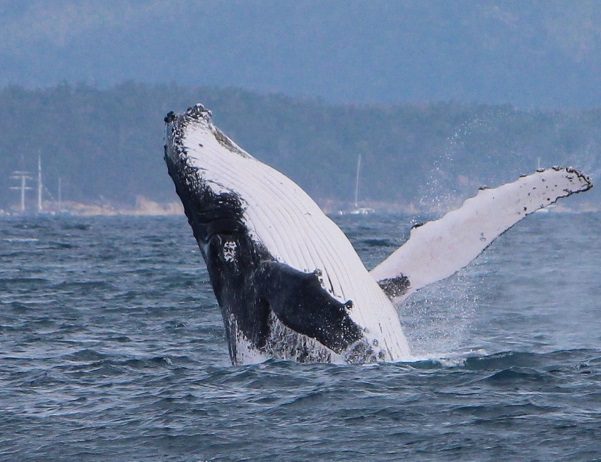 The Whitsundays has achieved Candidate Whale Heritage Site status from the World Cetacean Alliance, putting it on track to be the world’s first Whale Heritage Area within a World Heritage-listed site: the Great Barrier Reef.
The Whitsundays has achieved Candidate Whale Heritage Site status from the World Cetacean Alliance, putting it on track to be the world’s first Whale Heritage Area within a World Heritage-listed site: the Great Barrier Reef.
Encompassing 74 islands situated in the heart of the Great Barrier Reef, The Whitsundays is renowned for its significant population of whales; especially from June – October when thousands of whales migrate north each year from the cold waters of Antarctica to breed and give birth within The Whitsundays’ warm and calm tropical waters.
Commonly known as ‘Humpback Highway’, the waters of The Whitsundays are already highly-protected, with rules in place to ensure that whales (especially Humpbacks, the most common species found in The Whitsundays) are not stressed by boats, aircraft or other tourism-related operations.
Certification as a Whale Heritage Site however, will see The Whitsundays implement further protective programmes in respect of Cetaceans in The Whitsundays, which include whales and dolphins.
Whitsunday Environmental, together with Little Fish Tourism Development Consulting – the groups leading the application for Whale Heritage Site Accreditation – are working to actively engage the local community and tourists of The Whitsundays to satisfy the criteria for accreditation and to better understand the marine life that live and periodically visit the region.
“We’re currently working in close consultation with the Great Barrier Reef Marine Park Authority (GBRMPA) and other organisations including Tourism Whitsundays to enhance our knowledge of dolphins and whales through improved citizen science – that is, research conducted with public participation,” says Olivia Brodhurst, Director of Whitsunday Environmental and a qualified Marine Biologist.
“We’re encouraging public use of GBRMPA’s Eye on the Reef app, which is designed for the public to assist with tracking and long-term monitoring of marine wildlife. We also have a number of whale-centric events and activities in the works to really engage those who visit and live in The Whitsundays.
“Another exciting element is the incredible underwater hydrophone technology we’re working to bring to The Whitsundays to further engage tourism operators and their guests. The hydrophones will allow people to hear whale song in real-time and moreover, the technology will help to increase our data regarding the number and species of whales in the area.
“It’s all about trying to increase people’s awareness and love for Cetaceans, so they will be more likely to take other actions that will reduce human impact on our marine wildlife,” adds Ms Brodhurst.
Whitsundays-based Master Reef Guide, Crystal Lacey and Director of Little Fish Tourism Development Consulting, who works in close consultation with Tourism Whitsundays and tourism operators in the region – says that excitement is growing for the future of The Whitsundays as a Whale Heritage Site.
“It’s more than just a title. This is a World First, within a World Heritage Area. It’s proudly setting a gold standard for how sustainable practises and marine conservation can combine to support tourism-based economic development.
“It’s really exciting for us all in The Whitsundays and we want as many people as possible to join us in putting The Whitsundays on the map as the go to destination to see and hear these majestic giants of our oceans, without disturbing their natural processes and habitat,” says Ms Lacey.
The collaborating businesses anticipate full accreditation of The Whitsundays as a Whale Heritage Site by the end of this year. Currently, Hervey Bay on the Fraser Coast is the sole Whale Heritage Area within Australia.
For more information about The Whitsundays, visit tourismwhitsundays.com.au.



















